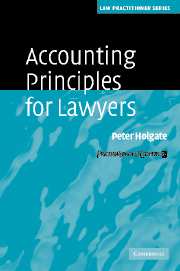Book contents
- Frontmatter
- Contents
- Acknowledgements
- Glossary of terms
- Part I The accounting environment
- Part II Some specifics
- 8 Individual entity accounts and consolidated accounts
- 9 Mergers and acquisitions
- 10 Interaction of accounting with tax
- 11 Assets
- 12 Liabilities
- 13 Leases
- 14 Pensions
- 15 Financial instruments, including capital instruments
- 16 Realised and distributable profits
- 17 Disclosures in published accounts
- 18 Use of financial information in contracts and agreements
- Appendices
- Index
18 - Use of financial information in contracts and agreements
from Part II - Some specifics
Published online by Cambridge University Press: 28 July 2009
- Frontmatter
- Contents
- Acknowledgements
- Glossary of terms
- Part I The accounting environment
- Part II Some specifics
- 8 Individual entity accounts and consolidated accounts
- 9 Mergers and acquisitions
- 10 Interaction of accounting with tax
- 11 Assets
- 12 Liabilities
- 13 Leases
- 14 Pensions
- 15 Financial instruments, including capital instruments
- 16 Realised and distributable profits
- 17 Disclosures in published accounts
- 18 Use of financial information in contracts and agreements
- Appendices
- Index
Summary
Introduction
Financial statements are used in many ways, most notably to monitor and analyse the profitability of a business both internally by its management and externally by shareholders and other interested parties. But an important specific role of financial statements is that they are used in various contracts and agreements. For example:
A limit to the amount that a company may borrow may be based on ratios taken from the financial statements, such as gearing, interest cover or other measures. If such limits are breached, various consequences may arise including the debt being immediately repayable.
In an agreement for the sale or purchase of a subsidiary, the price to be paid may include an initial amount plus a further amount of contingent consideration that may be payable depending on the level of profits in the period (typically one to three years) after the sale.
Part of the remuneration of a director, manager or group of employees may be based on an accounting measure such as growth in (or absolute amount of) a measure of profit such as operating profit, pre-tax profit, post-tax profit or earnings per share.
In a regulated industry, the regulator may restrain a company from charging a level of prices that results in the company making more than a given percentage of profit on its capital employed, defined in a certain way, for example with assets measured at current cost.
In this chapter, we explore how accounting measures are applied in situations such as the above.
Information
- Type
- Chapter
- Information
- Accounting Principles for Lawyers , pp. 185 - 192Publisher: Cambridge University PressPrint publication year: 2006
